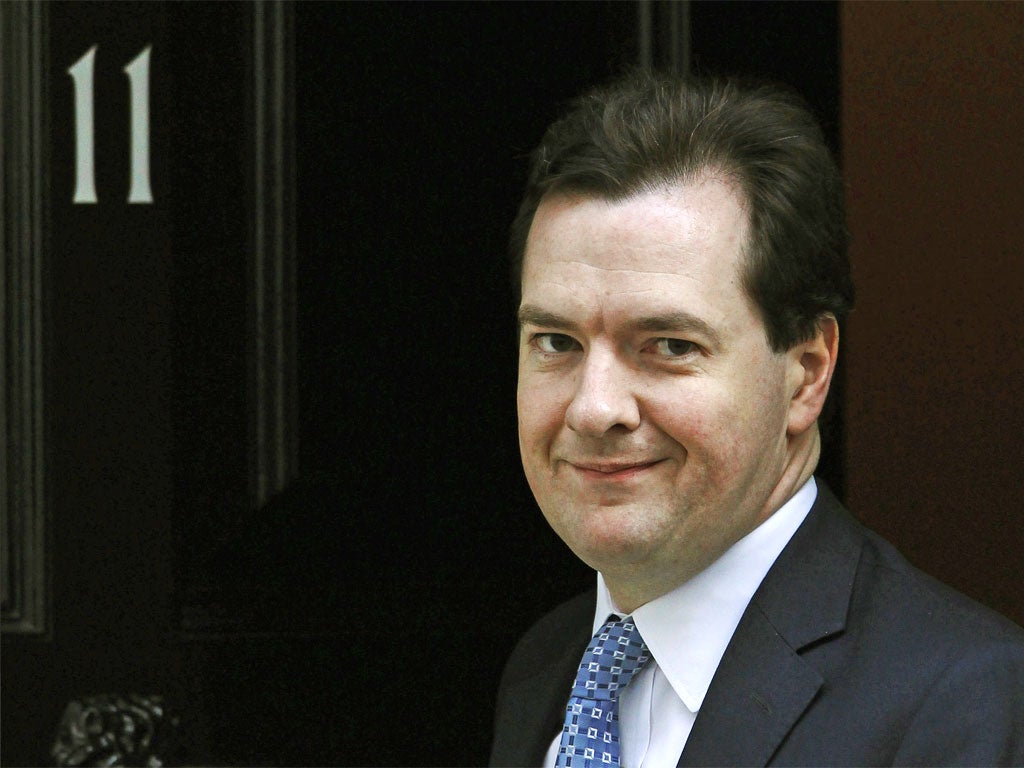George Osborne hopes 'tax cut' can propagate shoots of recovery
Chancellor expected to raise income tax allowance to £9,000 as forecasters predict slight increase in Britain's economic growth

Only one in five business leaders detects "green shoots" in the economy, according to a ComRes survey for The Independent.
While 21 per cent believe their own sector is growing, a bigger proportion (31 per cent) think it is still contracting, while 42 per cent say it is staying the same.
The picture of a flatlining economy will be underlined in the Budget today. But there may also be some cautiously optimistic news for George Osborne. The independent Office for Budget Responsibility is likely to raise its forecast last November that the economy will grow by 0.7 per cent this year to 0.8 per cent. Although hardly a cause for celebration, that would mean Britain avoids a double dip recession that would have called into question the Chancellor's economic strategy.
Today, Mr Osborne will argue that his deficit-reduction strategy is working and insist he is sticking firmly to it. The centrepiece of his third Budget will be what he will call a tax cut for millions of working people –by raising the amount they can earn before paying tax. He is expected to raise the personal tax allowance, which will be worth £8,105 next month, to around £9,000 from April next year. The estimated £4.5bn cost will be the biggest single item of new spending in the Budget and a significant "win" for the Liberal Democrats, who are within sight of achieving the £10,000 threshold promised in their last election manifesto.
Although he will have little money to play with, Mr Osborne will spell out a series of reforms to boost growth and "help Britain pay its way in the world". The aim is to answer criticism that the Government has a "cuts strategy" but no "growth strategy".
The Chancellor will take a huge political gamble by cutting the 50p tax rate on incomes above £150,000 a year to 45p from April next year. He is likely to find some money to soften the blow for middle-income earners from his decision to withdraw child benefit from taxpayers on the 40p higher rate from next January. Business is likely to benefit from a further cut in corporation tax, which has already been reduced from 28 to 25 per cent since the last election.
Despite the absence of many "green shoots", the ComRes survey of 121 business leaders makes grim reading for Labour. Some 69 per cent of them have confidence in David Cameron and 64 per cent in Mr Osborne. In contrast, a derisory 8 per cent have confidence in Ed Miliband and 19 per cent in Ed Balls, the Shadow Chancellor.
Liberal Democrat figures score more highly than the Labour economic team. Some 50 per cent of business leaders have confidence in Vince Cable, the Business Secretary, and 26 per cent in Nick Clegg, the Deputy Prime Minister.
The findings will reinforce fears among some Labour MPs that Mr Miliband's calls for a more "responsible capitalism" and attacks on "predators" have alienated the business world. Labour has launched a charm offensive in the hope of reassuring it that the party is not "anti-business".
A separate ComRes survey of 154 MPs from all parties suggests that Conservatives are becoming slightly more optimistic about Britain's prospects. Some 71 per cent of Tory MPs believe the economy will grow over the next year, as do 72 per cent of Liberal Democrat MPs. But only seven per cent of Labour MPs agree, with 50 per cent saying it will get worse and 40 per cent believing it will stay the same.
However, Tory MPs are more pessimistic about unemployment: 53 per cent think it will rise during the next 12 months and only 25 per cent think it will fall. Some 43 per cent of Liberal Democrat MPs think the jobless figures will get worse and 32 per cent think they will get better. Labour MPs are very gloomy: 95 per cent think unemployment will rise.
Labour is frustrated that the run-up to the Budget has been dominated by public wrangling between the Coalition parties over tax. Mr Balls has called that a "distraction" from the most important issues of jobs and growth.
Subscribe to Independent Premium to bookmark this article
Want to bookmark your favourite articles and stories to read or reference later? Start your Independent Premium subscription today.

Join our commenting forum
Join thought-provoking conversations, follow other Independent readers and see their replies